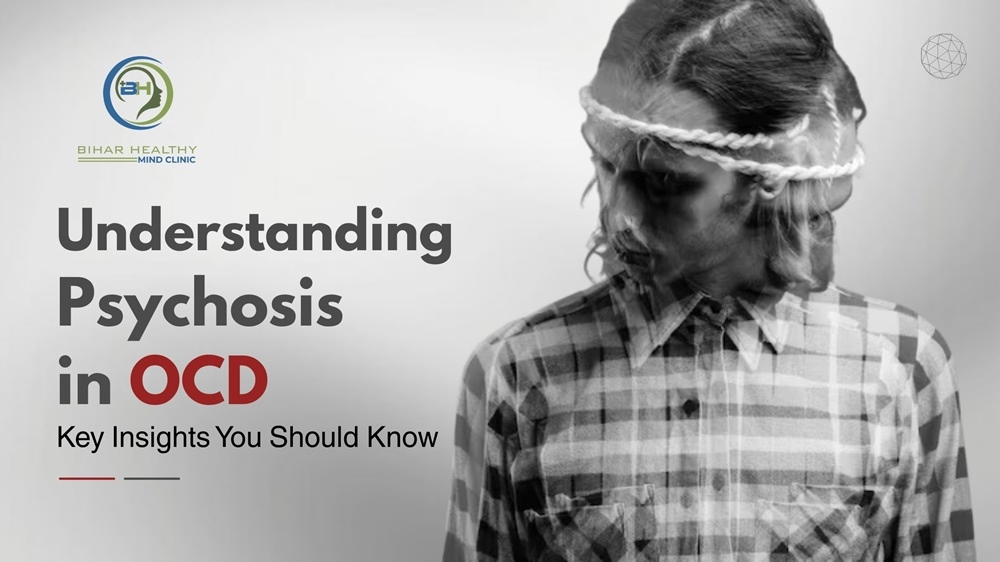
Obsessive-Compulsive Disorder (OCD) is frequently mistaken for just excessive neatness or constant checking behaviors. However, the reality is far more complex. When left untreated, severe OCD can sometimes evolve into symptoms that resemble psychosis in OCD, making diagnosis and management more challenging. At Patna Psychiatry, patients benefit from the specialized guidance of Dr. Saurabh Kumar, MD (Psychiatry), where care is both empathetic and rooted in scientific treatment methods for complex cases. This blog explores the critical differences, overlaps, and treatment approaches when OCD symptoms intersect with psychotic features.
What is OCD?
OCD is recognized as a psychiatric condition involving two fundamental aspects:
- Obsessions – disturbing, involuntary thoughts that create strong feelings of stress and anxiety.
- Compulsions – repetitive behaviors or rituals performed to reduce the anxiety caused by obsessions.
For instance, a person may feel an overwhelming fear of contamination (obsession) and spend hours washing their hands (compulsion). OCD is usually ego-dystonic, meaning people are aware that their thoughts and actions are unreasonable, which sets it apart from psychotic conditions.
What is Psychosis?
Psychosis is a condition in which a person becomes disconnected from reality, often experiencing hallucinations (perceiving things that aren’t real) and delusions (firmly held false beliefs). Unlike OCD, psychotic symptoms are ego-syntonic patients may not realize that their thoughts or perceptions are abnormal.
When OCD psychosis symptoms overlap, a patient may struggle to distinguish obsessive fears from psychotic delusions, making proper assessment crucial.
When Does OCD Become Psychosis?
Although OCD and psychosis are separate disorders, in certain cases they may present simultaneously. This overlap can present in the following ways:
Severe Obsessions Appearing Delusional
In some cases, obsessions are so intense that they resemble delusional thinking. For example, a person with OCD may believe with absolute certainty that failing to check a lock will cause a catastrophe.
Loss of Insight in OCD
Often, those living with OCD understand that their intrusive thoughts lack rationality. However, in severe cases, insight diminishes, and obsessions may appear indistinguishable from psychotic beliefs.
Comorbidity with Schizophrenia or Schizo-Obsessive Disorder
Some individuals with schizophrenia also exhibit OCD-like symptoms. This clinical picture is referred to as schizo-obsessive disorder where both OCD and psychosis coexist.
Symptoms That Suggest Psychosis in OCD
Differentiating between the two conditions is vital. Here are some warning signs that OCD may be progressing toward psychosis:
- A complete inability to question or resist intrusive thoughts.
- Obsessions transforming into rigid beliefs, similar to delusions.
- Presence of hallucinations along with compulsions.
- Severe functional impairment, where daily life becomes impossible.
- Increased emotional distress leading to withdrawal and isolation.
Why Early Diagnosis Matters
Identifying psychosis in OCD at the right time is crucial for creating an effective treatment approach. Left untreated, these conditions can lead to:
- Reduced quality of life.
- Increased risk of depression and suicidal ideation.
- Greater difficulty in distinguishing reality from intrusive thoughts.
- Social and occupational dysfunction.
At Patna Psychiatry, comprehensive evaluations help in identifying whether a patient’s struggles are rooted in OCD, psychosis, or a combination of both.
Treatment Approaches
Managing OCD with psychotic features requires a tailored, multi-modal approach:
Medication
- SSRIs (Selective Serotonin Reuptake Inhibitors): First-line treatment for OCD.
- Antipsychotics: Used when symptoms indicate psychosis or when OCD does not respond to SSRIs alone.
Psychotherapy
- Cognitive Behavioral Therapy (CBT): Specifically, Exposure and Response Prevention (ERP) helps patients gradually confront fears while resisting compulsions.
- Cognitive Restructuring: Addresses distorted beliefs and helps patients regain insight.
Combination Therapy
- Often, patients benefit most from combining pharmacological treatment with psychotherapy.
Supportive Care
- Family involvement, psychoeducation, and lifestyle adjustments can play a major role in recovery.
The Role of a Psychiatrist
Navigating the complexities of ocd psychosis requires specialized expertise. The Best psychiatrist in Patna, Dr. Saurabh Kumar, emphasizes accurate diagnosis, individualized care, and long-term support. His holistic treatment model at Patna Psychiatry integrates modern medical interventions with compassionate patient engagement, ensuring individuals regain stability and confidence.
Coping Strategies for Patients and Families
- Stay Educated: Understanding the difference between OCD and psychosis helps in reducing stigma.
- Seek Professional Help Early: Do not wait for symptoms to worsen.
- Follow Treatment Plans: Consistency in medication and therapy is essential.
- Support Systems: Encourage open discussions within the family and provide emotional support.
Conclusion
While OCD and psychosis are separate conditions, their overlap can complicate both diagnosis and treatment. Recognizing the early signs of psychosis in OCD is vital to prevent long-term consequences. With professional guidance, individuals can manage symptoms effectively and improve their quality of life.
At Patna Psychiatry, under the guidance of Dr. Saurabh Kumar, patients struggling with OCD, psychosis, or both, receive world-class psychiatric care. If you or your loved one is facing such challenges, reaching out to the Best psychiatrist in Patna could be the first step toward recovery.
Disclaimer: All characters and events depicted in this blog are entirely fictional. Any resemblance to actual persons, living or dead, is purely coincidental. The content is intended for informational purposes only and should not be considered as medical advice. Always consult a qualified healthcare professional for medical concerns.
Visitors: 128





No comments yet.